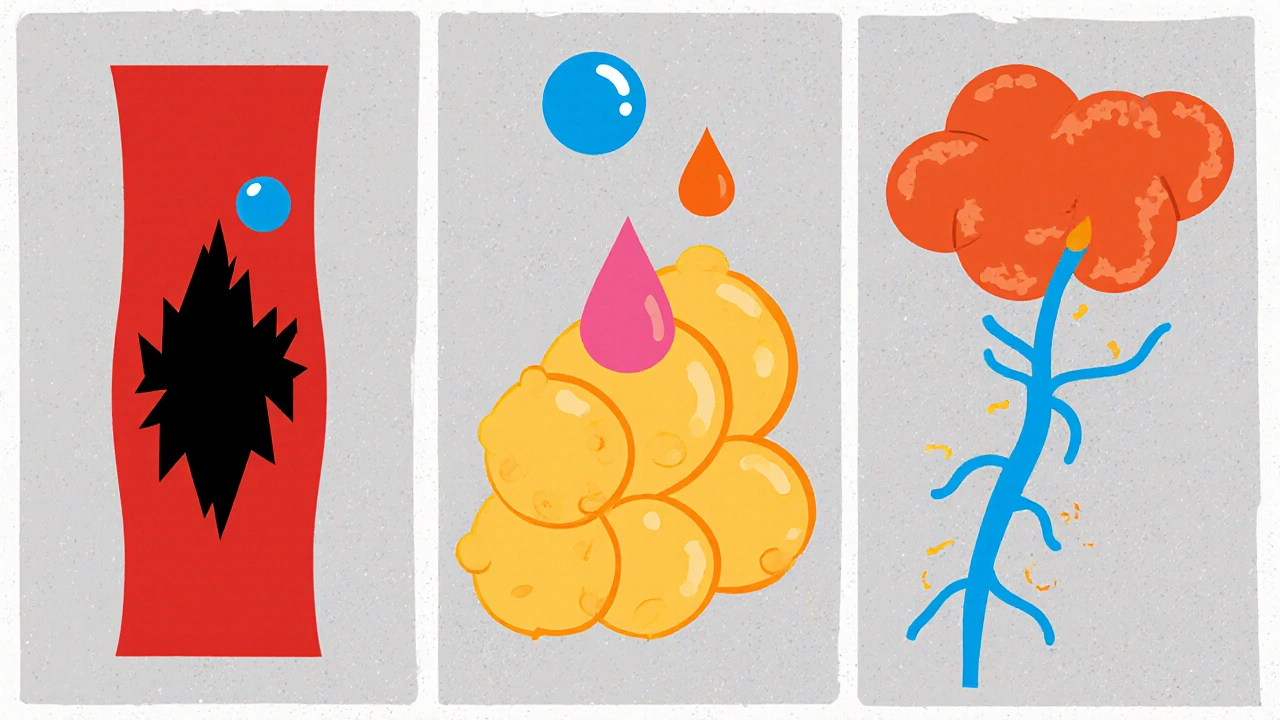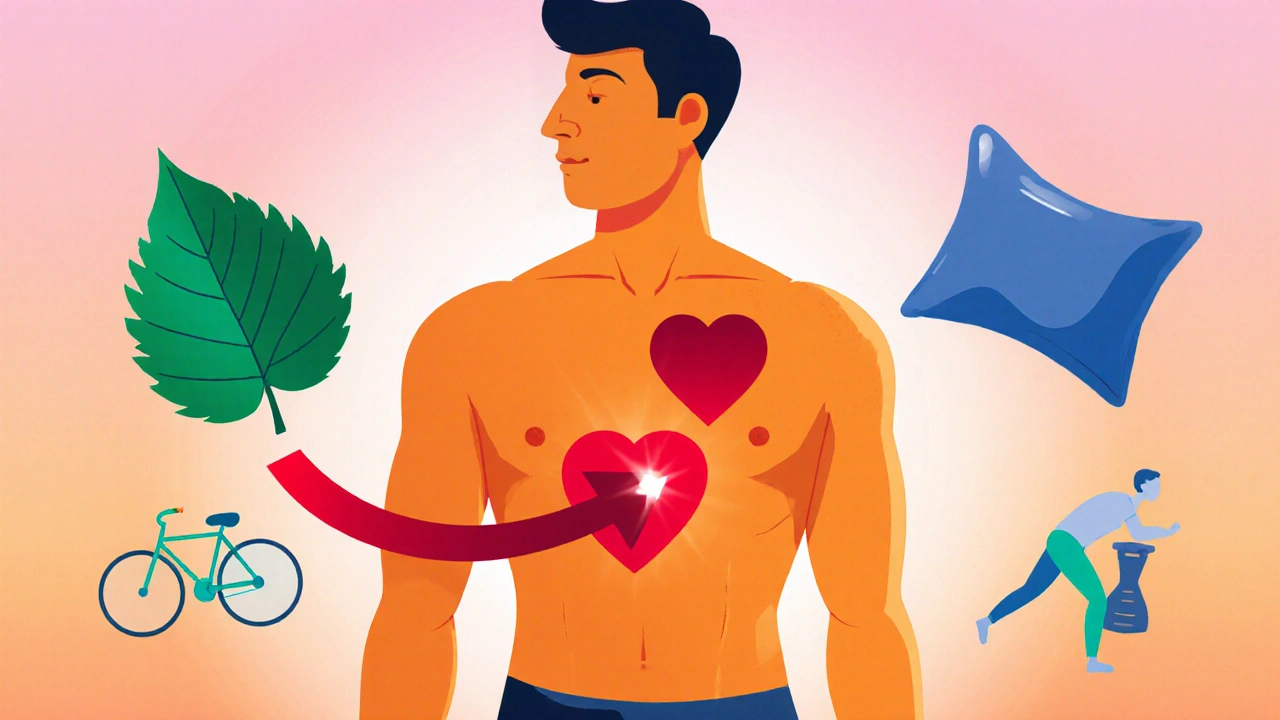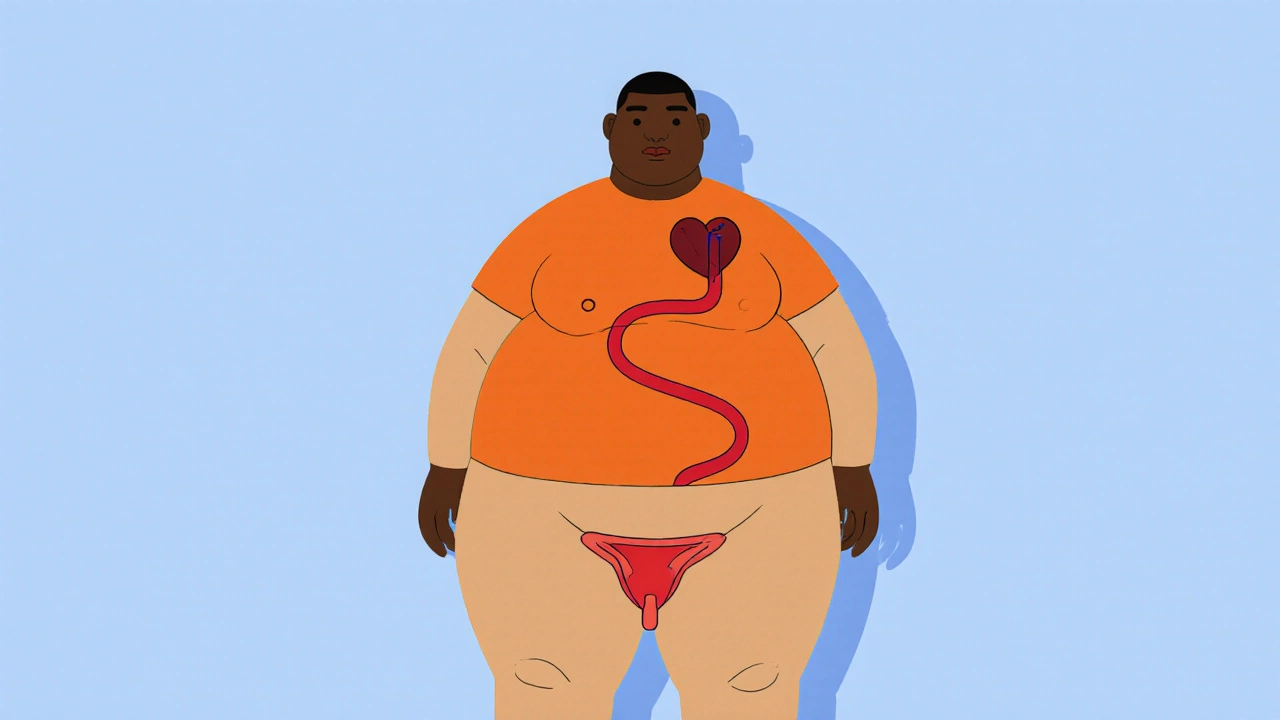ED Improvement Calculator
Estimate how much weight loss could improve your erectile function. Based on research showing that losing just 10% of body weight can significantly improve ED for many men.
Your Current Stats
Estimated Results
Enter your information above to see your estimated impact.
Important Note: This calculator uses data from clinical studies showing how BMI affects ED risk. Individual results may vary based on age, overall health, and other factors.
Obesity erectile dysfunction is a pairing you’ll hear more often in clinics, but why does extra weight mess with a man’s sex life? Below are the key points you need to know:
- Extra body fat changes hormone levels, especially testosterone, making erections harder to achieve.
- Obesity damages blood vessels, reducing the blood flow required for a firm erection.
- Inflammation and insulin resistance that come with excess weight affect nerve signaling in the pelvic area.
- Losing even 10% of body weight can improve erectile function for many men.
- Addressing lifestyle, mental health, and medical conditions together gives the best chance at restoring sexual health.
What exactly is obesity?
When most people talk about Obesity is a chronic condition characterized by excess body fat that poses a risk to health. It is commonly measured using Body Mass Index (BMI), where a BMI of 30 or higher classifies a person as obese.
Understanding erectile dysfunction (ED)
Erectile Dysfunction is the persistent inability to achieve or maintain an erection sufficient for satisfactory sexual performance. It affects about 30 million men in the United States alone, and prevalence rises sharply with age and weight.
Why weight matters: The biological link
The connection between obesity and ED isn’t just “extra weight = less desire.” It runs deep through three main pathways:
- Vascular damage: Fat deposits narrow arteries and reduce nitric oxide production, the chemical that relaxes smooth muscle in the penis. Without enough blood flow, an erection can’t fully develop.
- Hormonal imbalance: Fat tissue converts testosterone into estrogen. Lower Testosterone levels mean reduced libido and weaker erections.
- Metabolic inflammation: Obesity triggers chronic low‑grade inflammation, raising cytokines that impair nerve function and further blunt the erectile response.
These mechanisms often intertwine. For example, insulin resistance, a hallmark of Metabolic syndrome, worsens endothelial function, amplifying vascular problems.
Statistical snapshot: How obesity raises ED risk
| BMI Category | ED Rate (%) | Average Increase vs. Normal Weight |
|---|---|---|
| Normal (18.5‑24.9) | 7 | Reference |
| Overweight (25‑29.9) | 15 | ~+114% |
| Obese (30‑34.9) | 24 | ~+242% |
| Severe Obesity (≥35) | 36 | ~+414% |
These numbers come from a 2022 longitudinal study of 4,200 men, showing a clear dose‑response relationship.
Beyond erections: The broader impact on sexual health
ED is often the tip of the iceberg. Men with obesity also report:
- Decreased libido linked to low Testosterone and higher estrogen.
- Reduced orgasm intensity due to altered nerve conduction.
- Lower overall sexual satisfaction, affecting relationships and mental health.
- Increased performance anxiety, creating a vicious cycle where stress worsens ED.

Medical conditions that compound the problem
Obesity rarely acts alone. Co‑morbidities that further hinder sexual function include:
- Cardiovascular disease - impaired circulation throughout the body.
- Type 2 diabetes - damages blood vessels and nerves.
- Sleep apnea - lowers oxygen levels, disrupting erectile physiology.
- Depression and anxiety - mental health issues that can both cause and result from sexual dysfunction.
Can weight loss reverse the damage?
Yes, and the evidence is encouraging. A systematic review of 18 trials found that men who lost an average of 12 kg saw a 30% improvement in erectile scores. The mechanisms involved:
- Restored endothelial function and nitric oxide availability.
- Higher Testosterone levels, often rising by 10‑15 nmol/L after modest weight loss.
- Reduced inflammatory markers such as C‑reactive protein and interleukin‑6.
Even bariatric surgery, which can lead to a 30‑50% weight reduction, shows a 70% remission rate of ED in long‑term follow‑up.
Practical steps to improve sexual health while tackling obesity
Below is a roadmap that blends medical, lifestyle, and psychological interventions:
- Screen for hidden conditions: Get blood tests for lipid profile, fasting glucose, and hormone panel (testosterone, estradiol, SHBG).
- Adopt a Mediterranean‑style diet: Emphasize leafy greens, oily fish, nuts, and olive oil. This pattern reduces visceral fat and improves endothelial health.
- Gradual aerobic exercise: Aim for 150 minutes of moderate activity per week (brisk walking, cycling). Exercise boosts nitric oxide and raises testosterone.
- Strength training: Two sessions per week help preserve lean mass and further lift hormone levels.
- Sleep hygiene: Aim for 7‑8 hours; treat sleep apnea with CPAP if needed.
- Stress management: Mindfulness, yoga, or counseling can lower cortisol, which otherwise suppresses testosterone.
- Medical therapy: Phosphodiesterase‑5 inhibitors (e.g., sildenafil) work better when weight is reduced; discuss dosage with a doctor.
- Consider specialist referral: Urologists, endocrinologists, or bariatric surgeons can tailor treatment plans.
When lifestyle isn’t enough: Pharmacological and surgical options
For men who struggle despite weight loss, additional treatments include:
- Testosterone replacement therapy (TRT) - indicated only if blood tests confirm low levels and there’s no contraindication.
- Intracavernosal injections - direct delivery of vasoactive agents for men who don’t respond to oral meds.
- Penile implants - a surgical solution with high satisfaction rates, usually reserved for severe cases.
- Bariatric surgery - gastric bypass or sleeve gastrectomy can dramatically improve both obesity and ED when other methods fail.
All these options should be discussed in the context of overall cardiovascular risk.

Myths debunked
Many men think “ED is just in my head” or “only old men get it.” Reality check:
- Physical factors account for ~80% of cases, especially in the presence of obesity.
- You don’t need to be 60+; men in their 30s with a BMI ≥ 35 already have double the risk.
- Weight loss can help even after decades of excess weight - the body is surprisingly resilient.
Quick self‑check
Ask yourself these three questions:
- Is my BMI above 30?
- Do I have any of the common co‑morbidities (diabetes, hypertension, sleep apnea)?
- Have I tried at least three lifestyle changes (diet, exercise, sleep) without seeing improvement?
If you answer “yes” to any, it’s time to talk to a healthcare provider about both weight and sexual health.
Frequently Asked Questions
Can a man be overweight but not have ED?
Yes. Not every overweight man develops ED, but the risk rises sharply as BMI increases. Genetics, activity level, and existing health conditions all modulate that risk.
How long does it take to see sexual health improvement after losing weight?
Most men notice better erections within 3‑6 months of losing 5‑10% of body weight, especially when the weight loss comes from combined diet and exercise.
Is testosterone therapy safe for obese men with ED?
Only if blood tests confirm low testosterone and a cardiologist clears the patient. TRT can worsen sleep apnea and increase red‑blood‑cell count, so monitoring is essential.
Do PDE‑5 inhibitors work better after weight loss?
Studies show a 20‑30% higher response rate after modest weight loss, likely because improved blood flow makes the medication more effective.
What lifestyle change has the biggest impact on ED?
Regular aerobic exercise combined with a balanced diet provides the strongest benefit, as it tackles vascular health, hormone balance, and inflammation simultaneously.
Takeaway
Obesity is more than a number on a scale; it directly interferes with the physiological pathways that enable an erection. The good news? Targeted weight loss, better diet, and proper medical care can reverse many of those effects, restoring both performance and confidence. If you’re dealing with this issue, start with a health check, adopt small sustainable habits, and involve a specialist before the problem compounds further.


cariletta jones
Great summary! Even a quick read reminds you how important lifestyle tweaks can be for overall health.
Kevin Hylant
Weight really does affect blood flow, so shedding a few pounds can boost nitric oxide levels. Simple diet changes plus regular walks make a noticeable difference. Keep it consistent.
Eileen Peck
I totally get how frustrating it can feel when your body seems to be working against you.
Obesity isn’t just a number on the scale; it messes with hormones, blood vessels, and even your confidence.
When the fat tissue starts converting testosterone into estrogen, the drop in libido is almost inevitable.
That’s why many men notice a dip in sexual desire before they even experience a full‑blown erection problem.
The good news is that the body is surprisingly adaptable, especially when you give it the right fuel.
A Mediterranean‑style diet rich in veggies, fish, and olive oil can lower inflammation and improve endothelial function.
Regular aerobic exercise, even just brisk walking for 30 minutes most days, boosts nitric oxide production.
Strength training adds lean muscle, which helps keep testosterone levels afloat.
Don’t underestimate sleep – proper rest restores hormone balance and reduces cortisol, the stress hormone that can sabotage erections.
If you’re dealing with sleep apnea, a CPAP machine can dramatically improve oxygen levels and, in turn, erectile quality.
Many men who lose just 5‑10% of their body weight report stronger, more reliable erections within a few months.
Blood tests are a great way to track progress – look for lower fasting glucose and higher testosterone.
If you’re skeptical about meds, remember that PDE‑5 inhibitors work best when the vascular system is in good shape.
Sometimes, a referral to a urologist or endocrinologist can uncover hidden issues like low SHBG or subtle thyroid problems.
Bottom line: a balanced approach of diet, movement, sleep, and medical check‑ups gives you the best shot at turning things around.
Jonathan Harmeling
It's easy to blame the modern diet, but we also have a responsibility to take care of the bodies we were given. Ignoring the link between obesity and sexual health is just a lazy excuse that puts the burden on individuals instead of looking at systemic food issues.
Ritik Chaurasia
Enough with the academic mumbo‑jumbo – the facts are plain: excess fat clogs arteries, drops testosterone, and drags you down sexually. If you aren’t willing to cut the junk food now, don’t be surprised when you can’t perform later. Get serious, or keep living with the consequences.
Steven Young
While the blunt approach might catch attention, it ignores the underlying socioeconomic factors that drive unhealthy eating. Not everyone has easy access to fresh produce, and blaming them outright fuels stigma rather than solutions.
Kelly Brammer
Stigma is precisely the problem; personal responsibility must be emphasized. People need to understand that their choices have direct health repercussions, especially when it comes to intimacy.
Ben Collins
Oh sure, because adding a dash of guilt always motivates people to hit the gym. Maybe try a little empathy and less preaching next time?
Denver Bright
Interesting points all around. One thing worth noting is that some medications for diabetes actually improve erectile function, so the treatment plan can hit two birds with one stone.
Kelli Benedik
😭 This hits way too close to home!